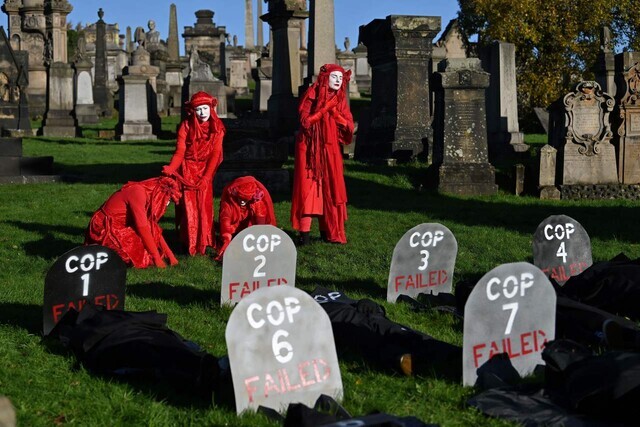hankyoreh
Links to other country sites 다른 나라 사이트 링크
[Editorial] COP26 must not be the end of our response to the climate crisis

After being touted as the “last, best hope” to save the planet, the 2021 United Nations Climate Change Conference, known as COP26, has ended amid disappointment.
As the clock ticked past midnight on Friday, the official final day of the conference, the Glasgow Climate Pact was finally signed after going through significant clashes. The final text contains the goal of “phasing down,” which represents a large step back from the original objective of completely phasing out coal-fired power generation in stages.
The plan to set up a US$100 billion fund for wealthy nations to help developing countries recover from climate damage has also been delayed. While the worldwide sense of crisis over climate disasters caused by global warming is stronger than ever, the ideal that nations around the world should tackle the problem together was ultimately unable to overcome the hurdle of “every man for himself” politics in which each country remains focused on their own costs and benefits.
More than anything, it was stubborn opposition from India, China and other countries that thwarted the goal of putting an end to the era of coal-fired power generation by 2030 for advanced countries and 2040 for the world as a whole.
India’s obstinate stance that developing countries are “entitled to the responsible use of fossil fuels” resulted in the goal changing from “stopping” to “reducing” emissions. When island nations who bear the brunt of climate change protested the diluted measures, COP26 President Alok Sharma responded by saying, “May I just say to all delegates I apologize for the way this process has unfolded and I am deeply sorry.”
Rich countries also failed to make good on their responsibilities. After promising to double financial support for developing countries by 2025, the US$100 billion fund that was supposed to be created through private and public funds from 2009 has fallen far short of that target.
The Glasgow Climate Pact ultimately fails to move beyond the abstract level of “taking action” against climate change over the next 10 years. The goal of limiting global warming to 1.5 degrees Celsius over pre-industrial was able to survive with some difficulty, and countries agreed to strengthen nationally determined contributions (NDC) and revisit the topic next year in order to achieve this goal.
An agreement was also reached on the implementation of rules agreed to at the Paris Climate Accords six years after its conclusion, and the international community has set forth a path for reductions in extraterritorial carbon emissions by developed countries to be recognized and subject to an “international emissions trading market.”
The decision by each government delegation to prioritize national economic benefit has further reduced the time we have left to save our planet from disaster. However, climate change is a question of existence that we cannot just give up on. We should listen to the voices of future generations who gathered in Glasgow during the conference to call for real solutions to save the planet. Countries must enact and carry out measures with a more responsible attitude, and we as individuals must also change our lifestyles.
Please direct questions or comments to [english@hani.co.kr]

Editorial・opinion
![[Editorial] Yoon must halt procurement of SM-3 interceptor missiles [Editorial] Yoon must halt procurement of SM-3 interceptor missiles](https://flexible.img.hani.co.kr/flexible/normal/500/300/imgdb/child/2024/0501/17145495551605_1717145495195344.jpg) [Editorial] Yoon must halt procurement of SM-3 interceptor missiles
[Editorial] Yoon must halt procurement of SM-3 interceptor missiles![[Guest essay] Maybe Korea’s rapid population decline is an opportunity, not a crisis [Guest essay] Maybe Korea’s rapid population decline is an opportunity, not a crisis](https://flexible.img.hani.co.kr/flexible/normal/500/300/imgdb/original/2024/0430/9417144634983596.jpg) [Guest essay] Maybe Korea’s rapid population decline is an opportunity, not a crisis
[Guest essay] Maybe Korea’s rapid population decline is an opportunity, not a crisis- [Column] Can Yoon steer diplomacy with Russia, China back on track?
- [Column] Season 2 of special prosecutor probe may be coming to Korea soon
- [Column] Park Geun-hye déjà vu in Yoon Suk-yeol
- [Editorial] New weight of N. Korea’s nuclear threats makes dialogue all the more urgent
- [Guest essay] The real reason Korea’s new right wants to dub Rhee a founding father
- [Column] ‘Choson’: Is it time we start referring to N. Korea in its own terms?
- [Editorial] Japan’s rewriting of history with Korea has gone too far
- [Column] The president’s questionable capacity for dialogue
Most viewed articles
- 1Months and months of overdue wages are pushing migrant workers in Korea into debt
- 2At heart of West’s handwringing over Chinese ‘overcapacity,’ a battle to lead key future industries
- 3Seoul getting its first-ever vertical farm
- 4Trump asks why US would defend Korea, hints at hiking Seoul’s defense cost burden
- 5Under conservative chief, Korea’s TRC brands teenage wartime massacre victims as traitors
- 6[Editorial] Yoon must halt procurement of SM-3 interceptor missiles
- 7[Editorial] When the choice is kids or career, Korea will never overcome birth rate woes
- 8[Guest essay] Maybe Korea’s rapid population decline is an opportunity, not a crisis
- 9[Column] For K-pop idols, is all love forbidden love?
- 10Fruitless Yoon-Lee summit inflames partisan tensions in Korea